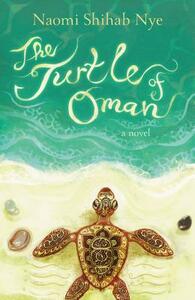Take a photo of a barcode or cover
This was my latest book from my Bethany Beach Box, which despite mostly 3/5 reads, I have been enjoying. I actually really like children's fiction, and it's been interesting to see what books are considered worth promoting this way. Turtle was another 3/5 read, honestly mostly because it was quite boring. As an adult, it was rather obvious that Nye's entire goal was to write a book that showed a Muslim family in a Muslim country in a positive light. There is nothing wrong with that, but considering how people complain about books written in the 1950's and how they're "too sweet" and not at all "realistic", it seems a little strange to turn around and praise a book that is basically sugar.
Aref and his parents are moving from Oman, a country in the Middle East, to Michigan, so that his parents can complete their doctorate degrees. Aref isn't happy about leaving, and most of the book are little adventures that he has with his grandpa as they visit all of their favorite places together. I honestly ended the book feeling quite aggravated with Aref's parents, who seemed to feel that their education and life was more important than Aref being close to his grandpa.
But what really bogged this book down were the lists. We're told at the beginning that Aref and his family love learning new things, and then writing down what they have learned that day. So throughout the book, whenever Nye wants her readers to learn something, we have to suffer through a list, in Aref's handwriting, telling us about the habits of turtles or how awesome it is to live in Oman under the rule of a sultan, which really added to the boring factor in this tale.
I realize that I am not the target audience for this book, but even at the age of ten I don't think that I would have enjoyed reading a bunch of lists. All in all, this book came across as a book that practically screamed USE ME FOR A UNIT STUDY IN YOUR SECOND GRADE CLASSROOM, but in my mind didn't have a lot to offer just simply as a story.
Aref and his parents are moving from Oman, a country in the Middle East, to Michigan, so that his parents can complete their doctorate degrees. Aref isn't happy about leaving, and most of the book are little adventures that he has with his grandpa as they visit all of their favorite places together. I honestly ended the book feeling quite aggravated with Aref's parents, who seemed to feel that their education and life was more important than Aref being close to his grandpa.
But what really bogged this book down were the lists. We're told at the beginning that Aref and his family love learning new things, and then writing down what they have learned that day. So throughout the book, whenever Nye wants her readers to learn something, we have to suffer through a list, in Aref's handwriting, telling us about the habits of turtles or how awesome it is to live in Oman under the rule of a sultan, which really added to the boring factor in this tale.
I realize that I am not the target audience for this book, but even at the age of ten I don't think that I would have enjoyed reading a bunch of lists. All in all, this book came across as a book that practically screamed USE ME FOR A UNIT STUDY IN YOUR SECOND GRADE CLASSROOM, but in my mind didn't have a lot to offer just simply as a story.
Aref is not looking forward to an impending move from Muscat to Michigan so his parents can attend graduate school. After spending time with his beloved grandfather and having some adventures with him Aref begins to adjust to the move and even look forward to it. I liked the way this book showed different parts of Oman as well as food, language, customs, animals, clothing etc. I liked Aref and felt Western children would be able to relate to him despite their superficial differences. I also liked the warm family relationships, especially between Aref and Siddi, but I wished the adults had acknowledged and validated his negative feelings about the move, rather than simply trying to talk him around.
Aref’s family is moving to Ann Arbor, Michigan from where he has always lived in Muscat, Oman. After his father heads off ahead of Aref and his mother, the two of them head home to finish packing and for his mother to finish working. But Aref does not want to leave Oman, leave his bedroom to his cousins who will be living there while they are gone for several years, leave his pet cat behind. But particularly, he does not want to leave his grandfather. Aref pretends to pack, but finds himself playing instead, riding his bike, ignoring the packing entirely. His mother gets frustrated and asks Siddi, his grandfather, for a hand. So the Aref and Siddi head out on a series of adventures that let them spend time together, but also let Aref say goodbye to his beloved Oman and be open enough to greet the future in Michigan.
Nye is the author of Habibi as well as an acclaimed poet. Her novel is short and wonderfully vivid, painting a picture of Oman for young readers who will be drawn to the natural beauty. Readers will also be taken by the loving family, where parenting is done with grace and kindness, and where a grandfather is willing to spend lots of time saying farewell, as much time as a child needs.
Nye’s writing shows her poetic skills again and again. Her prose reads like verse, filled with imagery and striking wording. When Aref goes to the sea with his grandfather, Nye describes it like this:
The sky loomed with a few delicate lines of wavery cloud, one under the other. It looked like another blue ocean over the watery blue sea. Aref took a deep breath and tried to hold all the blue inside his body, pretending for a moment he didn’t have to move away or say good-bye to anything or share his room and cat, none of it.
Many of the moments with Aref and his grandfather are written like this, celebrating the tiny pieces of beauty in the world, relishing the time, treasuring the wonder. Her book is like a jewel, faceted and lovely to turn and marvel at.
This short novel is a vivid and majestic look at the Middle East, at familial love, and at the special relationship of a boy and his grandfather. Appropriate for ages 8-12.
Nye is the author of Habibi as well as an acclaimed poet. Her novel is short and wonderfully vivid, painting a picture of Oman for young readers who will be drawn to the natural beauty. Readers will also be taken by the loving family, where parenting is done with grace and kindness, and where a grandfather is willing to spend lots of time saying farewell, as much time as a child needs.
Nye’s writing shows her poetic skills again and again. Her prose reads like verse, filled with imagery and striking wording. When Aref goes to the sea with his grandfather, Nye describes it like this:
The sky loomed with a few delicate lines of wavery cloud, one under the other. It looked like another blue ocean over the watery blue sea. Aref took a deep breath and tried to hold all the blue inside his body, pretending for a moment he didn’t have to move away or say good-bye to anything or share his room and cat, none of it.
Many of the moments with Aref and his grandfather are written like this, celebrating the tiny pieces of beauty in the world, relishing the time, treasuring the wonder. Her book is like a jewel, faceted and lovely to turn and marvel at.
This short novel is a vivid and majestic look at the Middle East, at familial love, and at the special relationship of a boy and his grandfather. Appropriate for ages 8-12.
It's a beautifully written story that I really wanted to love, but I felt that it dragged a bit...and I can usually get down with a quiet story.
A sweet book about moving and about a boy's relationship with his grandfather.
emotional
funny
hopeful
reflective
medium-paced
Strong character development:
Yes
Loveable characters:
Yes



